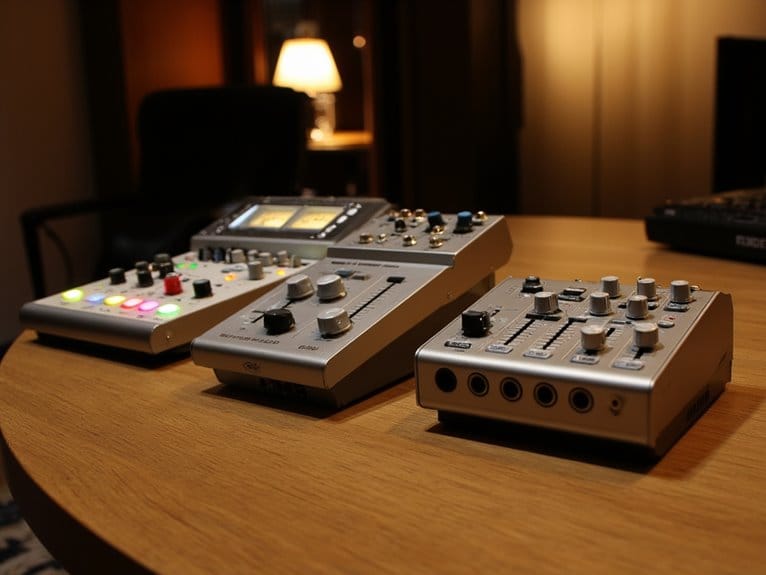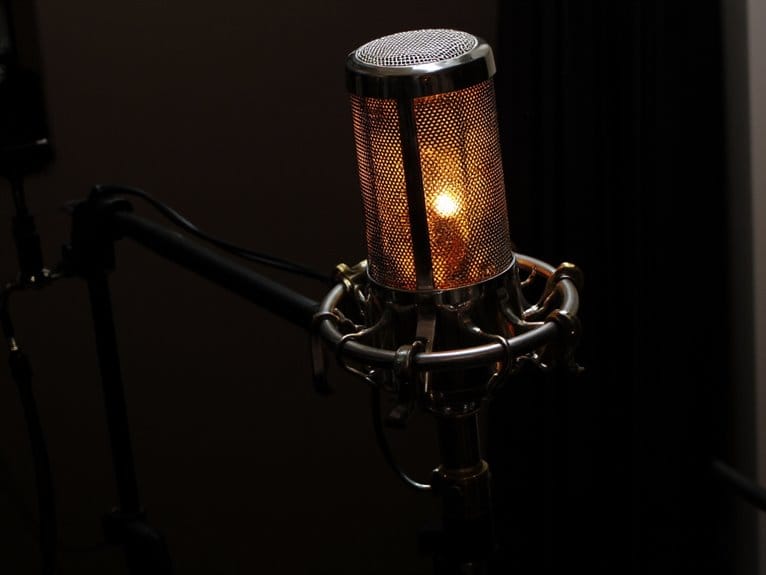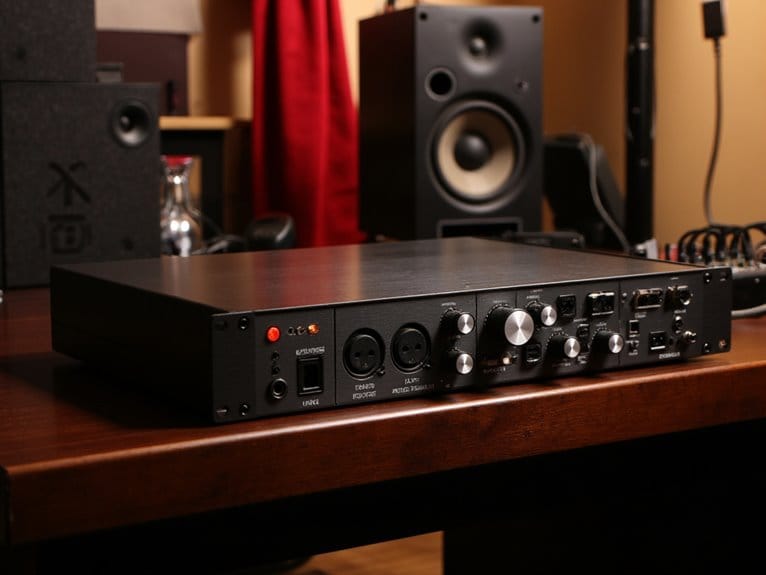Who Is Best Lead Guitarist?
The age-old debate: who’s the best lead guitarist? The 60s had Clapton, Beck, and Page redefining rock. The British Invasion brought Townshend and Blackmore. The 70s saw the rise of Angus Young, Jeff Beck, and Ritchie Blackmore. The shredder era brought virtuosos like John Petrucci and Tosin Abasi. Southern rock and blues masters like Duane Allman and Stevie Ray Vaughan left their mark. But let’s be real, narrowing it down to one is like choosing a favorite child – it’s impossible. Yet, the real magic happens when you delve into the depths of these iconic axes, and that’s where the true legends are made.
We are supported by our audience. When you purchase through links on our site, we may earn an affiliate commission, at no extra cost for you. Learn more.
Legendary Axes of the 60s
Only three axemen – Eric Clapton, Jeff Beck, and Jimmy Page – can claim to have single-handedly redefined the sound of rock music in the 1960s. These guitar gods didn’t just play their instruments; they worshipped them, coaxing out sounds that still give Fender Fanatics goosebumps today. Clapton’s mastery of the Fender Stratocaster in Cream and Blind Faith is the stuff of legend, while Beck’s innovative use of feedback and distortion spawned a new generation of sonic trailblazers. Meanwhile, Page’s Les Paul-driven riffs in Led Zeppelin continue to shake the very foundations of rock. These pioneers of electric guitar conjured up Vintage Vibes that still resonate deeply, influencing countless musicians and shaping the course of rock history.
British Invasion and Beyond
Only a handful of guitar heroes successfully rode the wave of the British Invasion, but among them, Pete Townshend and Ritchie Blackmore stood tall, their innovative styles and iconic riffs forever etching their names into the annals of rock history. These British rockers redefined the sound of rock music, pushing the boundaries of what was possible on the guitar. As Invasion icons, they inspired a generation of musicians to follow in their footsteps. Townshend’s windmilling antics and Blackmore’s neoclassical flair set them apart from their contemporaries, cementing their status as legends of the genre. Their influence can still be heard today, a legacy to the enduring power of their music.
Guitar Heroes of the 70s
As the British Invasion‘s sonic boom began to dissipate, a new crop of guitar virtuosos emerged in the 1970s, hell-bent on shredding the rules and rewriting the playbook. This decade saw the rise of iconic axe-wielders like Jeff Beck, who effortlessly merged blues and rock, and Ritchie Blackmore, whose neo-classical flair earned him a spot among the elite. The Jimmy Page influence was palpable, with his Les Paul-driven riffs and epic arrangements inspiring a generation. Meanwhile, Angus Young‘s schoolboy antics and lightning-fast solos redefined the term “rock star.” These guitar heroes of the 1970s pushed the boundaries of their instrument, crafting a new language that would be spoken for decades to come. Their innovative spirit and technical mastery continue to inspire and influence new generations of guitarists.
The Shredder Era Begins
Fasten your seatbelts, because the late 1970s and early 1980s witnessed a paradigm shift in guitar playing, as a new breed of virtuosos, armed with lightning-quick arpeggios and face-melting solos, hijacked the music scene, leaving a trail of bewildered listeners and inspired imitators in their wake.
This era marked the dawn of the shredder, where guitarists pushed the limits of speed, technique, and creativity. Some notable characteristics of this era include:
- Shredder techniques: Lightning-fast alternate picking, sweep picking, and legato playing became the norm.
- Neoclassical influences: Guitarists drew inspiration from classical music, incorporating complex harmonies and melodies into their solos.
- Virtuosic showmanship: Guitar heroes like Eddie Van Halen and Yngwie Malmsteen redefined the art of soloing, making it a spectacle to behold.
Southern Rock and Blues Masters
While the shredders were busy melting faces with their lightning-fast arpeggios, a parallel universe of guitar heroes was brewing in the Southern states, where the blues and rock ‘n’ roll converged in a sweet, sweet marriage of twangy guitars and soulful vocals. These Southern rock and blues masters drew from their rich cultural heritage, digging deep into their Southern roots to craft a unique sound that was both authentic and innovative. Legends like Duane Allman, Dickey Betts, and Stevie Ray Vaughan carried the torch, their playing infused with the emotional intensity and storytelling prowess of Blues legends like Robert Johnson and Muddy Waters. Their influence can still be felt today, an affirmation to the power of blues-infused rock ‘n’ roll to move and inspire.
Modern Masters of the Fretboard
In the wake of their blues-rock forebears, a new generation of fretboard wizards emerged, armed with a dizzying array of chops, effects pedals, and a fearless attitude that shredded the rulebook. These modern virtuosos redefined the boundaries of guitar playing, pushing the limits of speed, technique, and creativity. Among the most notable are:
- John Petrucci, whose intricate, lightning-fast solos with Dream Theater redefined the art of shred guitar
- Tosin Abasi, whose innovative, effects-heavy playing with Animals as Leaders has inspired a new generation of ambient metalheads
- Guthrie Govan, whose jaw-dropping chops and genre-bending style have made him the go-to guitarist for everyone from Steven Wilson to Hans Zimmer.
Iconic Riffs and Solos
From the opening salvos of ‘Sweet Child O’ Mine‘ to the face-melting majesty of ‘Stairway to Heaven,’ iconic riffs and solos have become an integral part of our collective musical DNA. These sacred cows of rock guitar have been etched into our brains, making it impossible to imagine a world without them. The Riff Revival of the 70s and 80s spawned a generation of guitar heroes, each trying to outdo the other in a frenzy of fretboard frenzy. And then, of course, there’s Solo Sanctity – the hallowed ground where legends like Hendrix, Page, and Clapton reign supreme. But let’s be real, folks, it’s not just about technical prowess; it’s about crafting something that makes our souls sing.
The Case for the Underdogs
Beyond the pantheon of guitar deities, a slew of underappreciated axemen have been quietly crafting riffs and solos that are just as face-melting, yet somehow flew under the radar of mainstream adoration. It’s time to give these hidden gems their due. They may not have the same level of fame as their iconic counterparts, but their skills are just as impressive.
- Take, for example, the underrated virtuoso, Tony MacAlpine, whose neoclassical shred-fest ‘Edge of Insanity’ is a masterclass in technical wizardry.
- Or how about the criminally overlooked, Vinnie Moore, whose work with UFO is a tribute to his mastery of melodic metal?
- And let’s not forget about the enigmatic, Richie Kotzen, whose blues-infused rock is a perfect blend of soul and shred.




